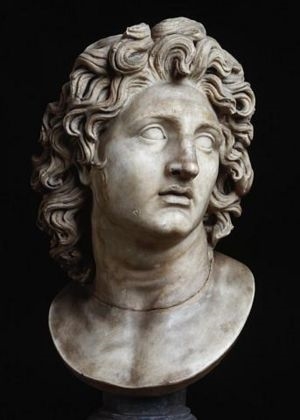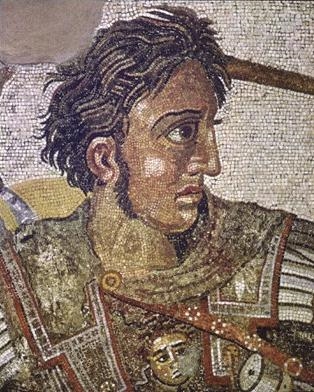 |
| A marble bust of Alexander |
Alexander the great was a fearless leader who would conquer the ancient known world and bring it under Greek rule. A legend in his own time, Alexander built an empire that spanned from the Greek city-states south to Egypt and east to modern day Iraq. This Herculean task he set out to do at age 20 and accomplished before his tragic death at age thirty-two. Alexander was born in Macedonia to King Phillip II and Queen Olympias. These were no ordinary parents. It was believed throughout the Hellenic world that Phillips was a descendant of Heracles (also know as Hercules), and that Olympias’ family was directly descended from Achilles, the hero of Homer’s epic poem The Iliad. Together they made a power couple on Earth and in the heavens. Making Phillip even more famous, was the fact that he had conquered all of Greece. The couple raised Alexander to be a king, military leader and hero in the classic Greek sense. “Alexander emerged as a man of sharp contrasts. His education ranged from a physically demanding training in the arts of athletics and war to an elite education which included tutoring at the hands of the eminent Greek philosopher Aristotle. The result was a lithe, athletic man who, while not physically imposing, revealed remarkable powers of endurance, magnified by an imposing character and unbreakable will. Alexander's contrasting physical features—the soft moist eyes, slight flush, sharp nose, fierce expression, and loud and harsh voice—reflected the emotional extremes of a man capable of both overwhelming generosity and violent outbursts of temper.” "Alexander III, the Great." DISCovering Biography. Detroit: Gale, 2003. Gale Student Resources In Context. Web. 19 May 2011Alexander was courageous. He always led lead his army into battle from the front, often receiving serious injury. Alexander the Great is a hero for many reasons. Through his military genius and courage, he united the entire ancient world under one rule. But he did more than just build the greatest empire the world had ever seen, Alexander spread Western philosophy, science and mathematics throughout that empire.
Alexander the great was truly a courageous young man. In fact, he was a hero in the Greek sense. He was a legendary figure, believed to be descended from the gods, endowed with great ability, and an famous warrior and adventurer. He was known for leading his men into battles from the front, often charging his horse Bucephalus into the most dangerous parts of the fight “Alexander led the cavalry charges himself, seemingly oblivious to danger; his horse was killed under him and a sword swipe cleaved the crest of his helmet.” "Alexander III, the Great." DISCovering Biography. Detroit: Gale, 2003. Gale Student Resources In Context. Web. 19 May 2011. This form of leadership has been followed down through the centuries. Julius Caesar, who admired Alexander, wore a red cloak so that his men would see him as he charged into battle. Even George Washington expected his officers to lead from the front. Washington ordered his officers to wear their insignia on the back of their hats, so that their men would see them as they led from the front.
 |
| A mosaic of alexander |
Some will say that Alexander’s father gave the young prince everything he would need to succeed, great wealth, the finest army the world had ever seen, and an education equal to none. But there were a few tasks for Alexander to complete before he could set out to conquer the known world. “In 336 B.C.E., at the age of twenty, the Macedonian king Alexander III, or Alexander the Great, inherited the resources and wealth of the Macedonian state left to him by his father, Philip II. Alexander was forced to execute several pretenders to his throne, subdue the Thracians and Illyrians (old enemies of the Macedonians), and quell a Greek revolt before he could travel with his army into Asia Minor to begin his conquest of Persia (in 334).” The Military Campaigns of Alexander the Great." World Eras. Ed. John T. Kirby. Vol. 6: Classical Greek Civilization, 800-323 B.C.E. Detroit: Gale Group, 2001. 35-36. Gale Student Resources In Context. Web. 19 May 2011.It was Phillip’s dream to conquer Persia. But he was assassinated before he could launch the invasion he had worked for all his life. So Alexander stepped in.
Typically when the Greeks took control of a city, they would kill the men and children, and enslave the women. Alexander often showed more mercy. When Alexander conquered a city, instead of killing his rivals, Alexander would round up the children of the leaders and send them to Greece to learn Greek philosophy, sciences, mathematics and architecture. He made it possible for diverse cultures to share ideas. “From the beginning, his armies had recruited local troops, but with the full conquest of Persia, they stepped up this policy. It was his goal to leave Persia in the control of Persians trained in the Greek language and Greek culture, and he left behind some 70 new towns named Alexandria. Thus began the spread of Hellenistic culture throughout western Asia.” "Alexander the Great." Science and Its Times. Ed. Neil Schlager and Josh Lauer. Vol. 1. Detroit: Gale, 2001. Gale Student Resources In Context. Web. 20 May 2011.Alexander changed the world, molding it into a Greek model. Even though he lived but 32 years, Alexander’s fame lives to this day.In just 12 years, Alexander the Great brought together the East and West.Because Alexander was more interested in spreading Western culture, he molded the world into his image.
Alexander the Great personified heroism in the classic Greek sense. He was a legendary figure, believed to be descended from the gods, endowed with great ability, and a famous warrior and adventurer. But he was more than a military leader, he was also a statesman and leader in spreading Western ideals. While it may be too late for anyone to conquer the word, it is not too late to introduce great ideas to the world. Perhaps by doing so you can still make a name that stands the test of time.
Page created on 5/20/2011 12:00:00 AM
Last edited 5/20/2011 12:00:00 AM
